Introduction
2020 marks the 50th anniversary of the passing of a pioneering piece of social legislation called the Chronically Sick and Disabled Persons Act (CSDPA). Following its passing in 1970 it was hailed as a magna carta for people with disabilities, a key milestone in the development of rights and provision of services for people with various health conditions and a model for such legislation worldwide.
This exhibition tells the story of the passing of the Act largely through extracts from the papers of Alf Morris MP, who plotted its journey through Parliamentary processes and onto the statute book. Morris became the World's first Minister for the Disabled in 1974 and continued to fight for disability rights throughout his career, including the Disability Discrimination Act which also celebrates its 25th anniversary in 2020. He was made Lord Morris of Manchester in 1997 and LSE Library is the custodian of his papers.
Content Warning
Please be aware that this exhibition features material which was created many years ago. Some of this material contains language and terminology which is outdated and which visitors may find upsetting.
Listen to the introduction:
The Luck of the Draw


These are two extracts from letters sent to Alf in November 1969 after Alf's name was drawn in first place in the annual Private Member's Bill ballot.
This stroke of luck gives the 20 MPs who are drawn the chance to propose and draft a piece of legislation. If the Bill gets through the debates and amendments in the House of Commons and then the Lords it finally becomes law. Watch the draw for the 2019/20 session.
In November 1969 Alf Morris won a coveted first place in the ballot. Good news travelled fast and he received numerous requests from individuals and organisations to draft legislation that would support their causes. Suggestions came from the Consumer Council, the League Against Blood Sports; the Registered Plumbers Association and the National Civil Liberties Council. He was also asked to support a bill for Voluntary Euthanasia.
Alf chose instead to focus attention on people with disabilities.
Listen to the section 'The Luck of the Draw':
The Act
The CSDPA was a significant advance in the provision of social services for the long-term sick and disabled.
The final CSDPA Act included clauses which:
- Made it a duty for local authorities to actively collect information about how many people were covered by the Act within their jurisdictions and to inform them of the services they could get access to.
- Made services available including at-home assistance; help with transportation to use services; access to recreational equipment and facilities; at-home meals and the provision of telephones to aide with communication.
- Made authorities responsible for ensuring suitable housing was provided and public buildings were made accessible, including the provision of toilets.
Listen to the section 'The Act':
Allies and Assistance
Alf had support from a number of people in the drafting of the legislation and some of these have been kept as part of his papers.
These include a letter from fellow Labour MP Jack Ashley asking Alf to take account of a number of proposed clauses for his Bill, including the suggestion for a Disability Rights Board to be established - something which arguably only happened when the Disability Rights Commission was launched in 1999:
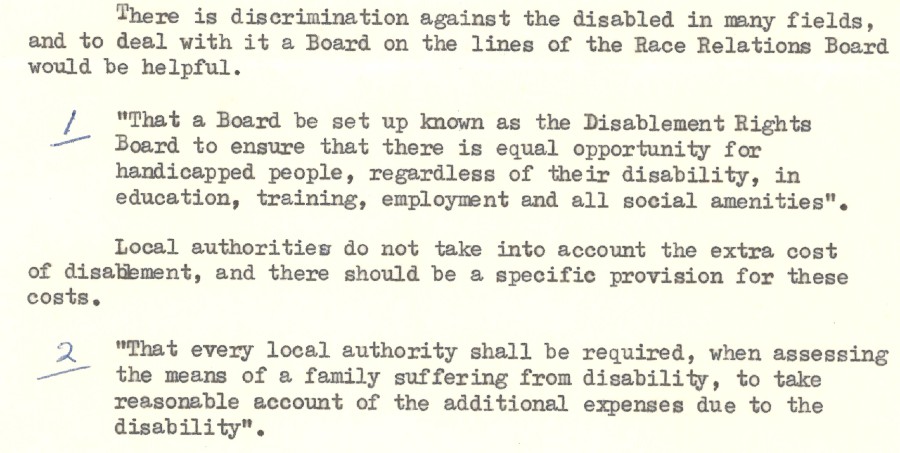
Jack was keenly receptive to the Act and worked closely with Alf on its creation. His name also appears as part of this Joint Ad Hoc Committee which met with the Central Council of the Disabled to discuss Alf’s Bill in January 1970:
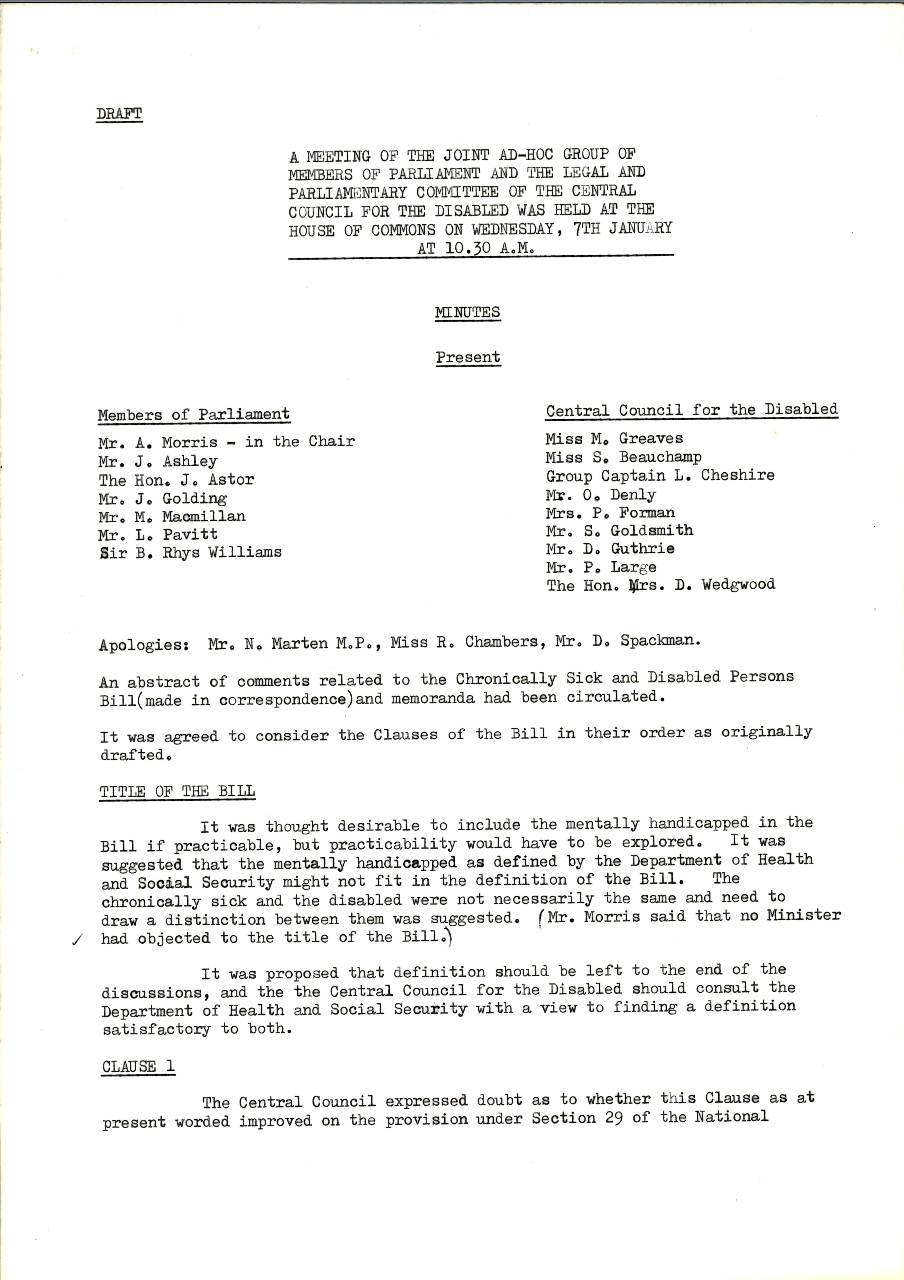
Ashley was himself prominent as the first fully deaf MP and worked throughout his career with campaigners and organisations to progress disability rights.
You can also see a fuller list of organisations which contributed to the Act here:
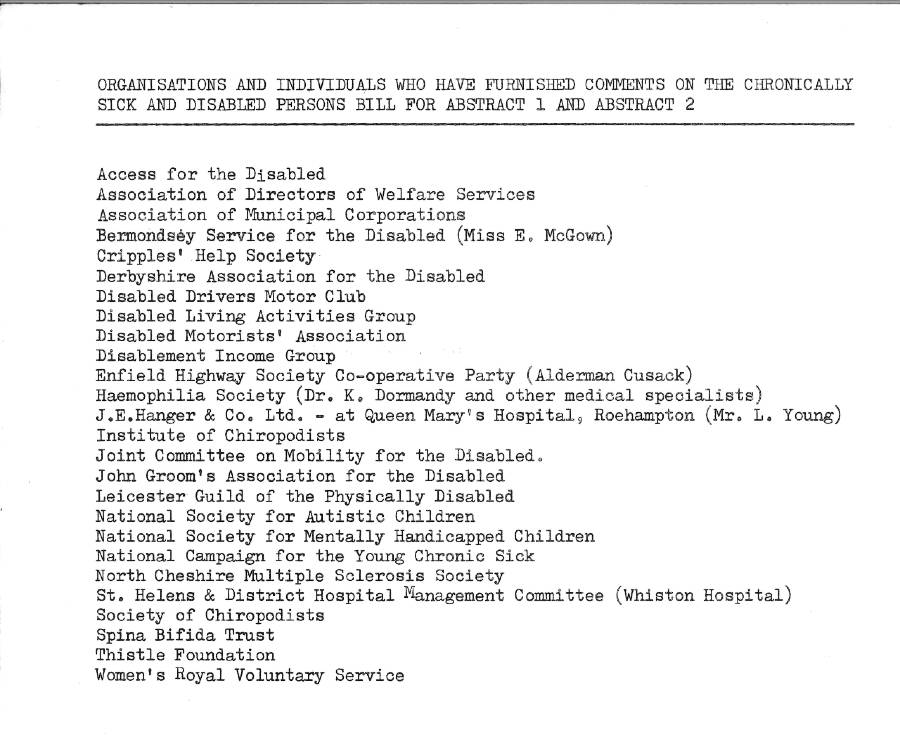
Listen to the section 'Allies and Assistance':
Contemporaries
There had been recent legislation proposed to support people with disabilities. In 1968 Conservative MP Jim Prior had drafted a Private Members Bill called the Disabled Persons' Pensions and Miscellaneous Provisions Bill. The Bill made a number of recommendations such as the provision of a disability pension and proposals to make public buildings provide better access to people with disabilities. However, it didn’t get enough votes to get past a second reading in the Commons and was shelved.
This is a page showing some of the provisions considered for the Bill:
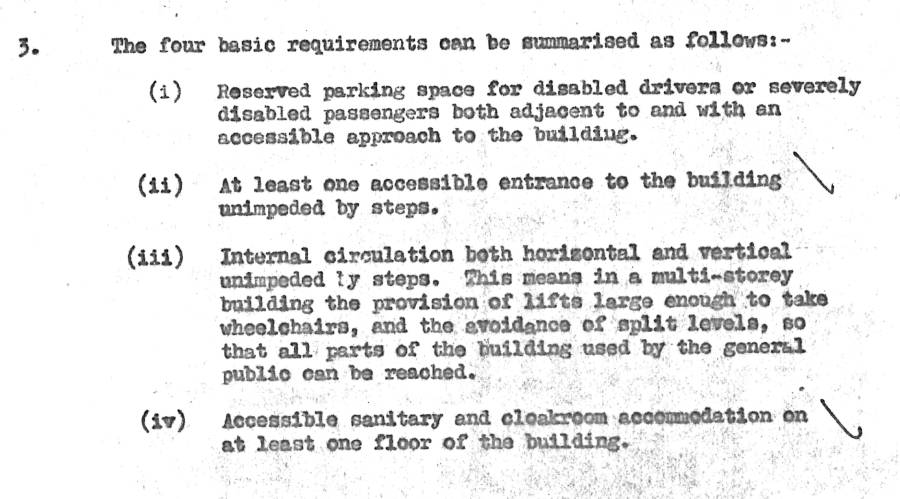
A few months after the CSDPA was passed, The Education (Handicapped Children) Act also made it onto the statute book. Prior to the Act passing, children with learning difficulties were considered to be ‘ineducable’ and not entitled to education within the school system. The Act overturned this and, for the first time, gave Local Education Authorities responsibility for all children’s education.
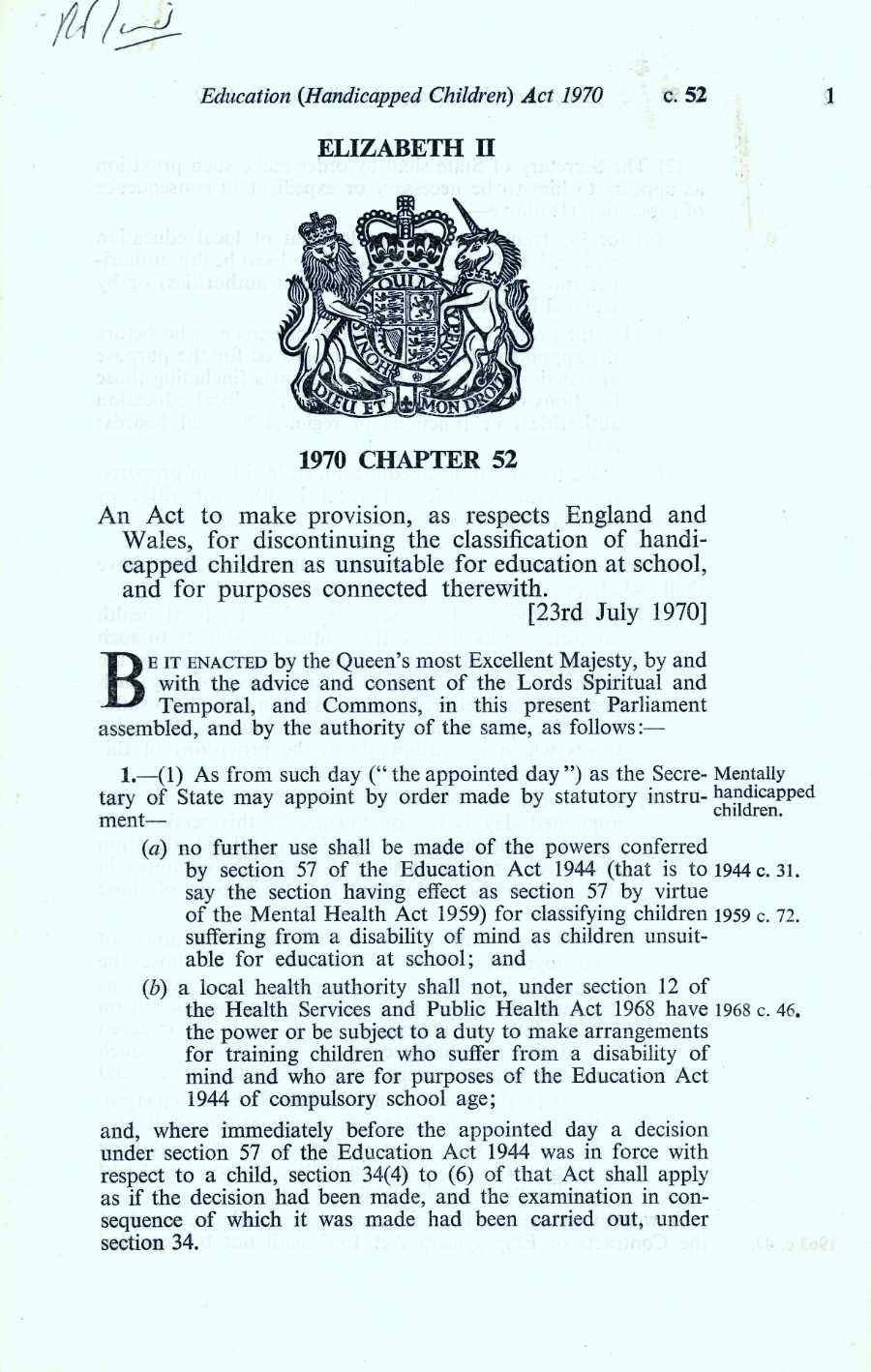
Listen to the section 'Contemporaries':
Causes and Campaigners
Often legislative change comes after causes and campaigns have drawn attention to an injustice. The CSDPA was no different.
One of the key groups from the 1960s calling for change was the Disablement Income Group (DIG). They were founded in 1965 by two pioneering disabled women: Megan Du Boison and Berit Moore who were angered at the lack of financial support available to people with disabilities. DIG was a ‘pan-impairment’ campaign i.e. they looked at issues affecting all people with disabilities and regardless of the specific health conditions or impairments that people had.
Here is an extract from an early leaflet produced by DIG and sent to Labour politician (and contemporary of Alf’s) Peter Shore, which shows some of their early thinking:
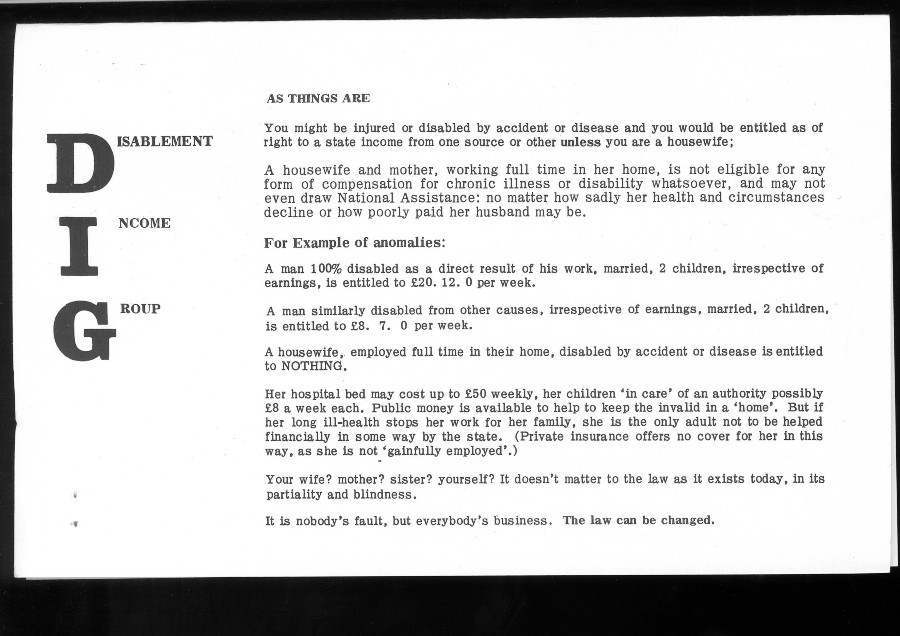
There’s also material from a smaller and less well-known organisation called the National Campaign for the Young Chronic Sick (NCYCS).
This is an extract from a letter sent to Alf from Marsh Dickson who was the President of the NCYCS.
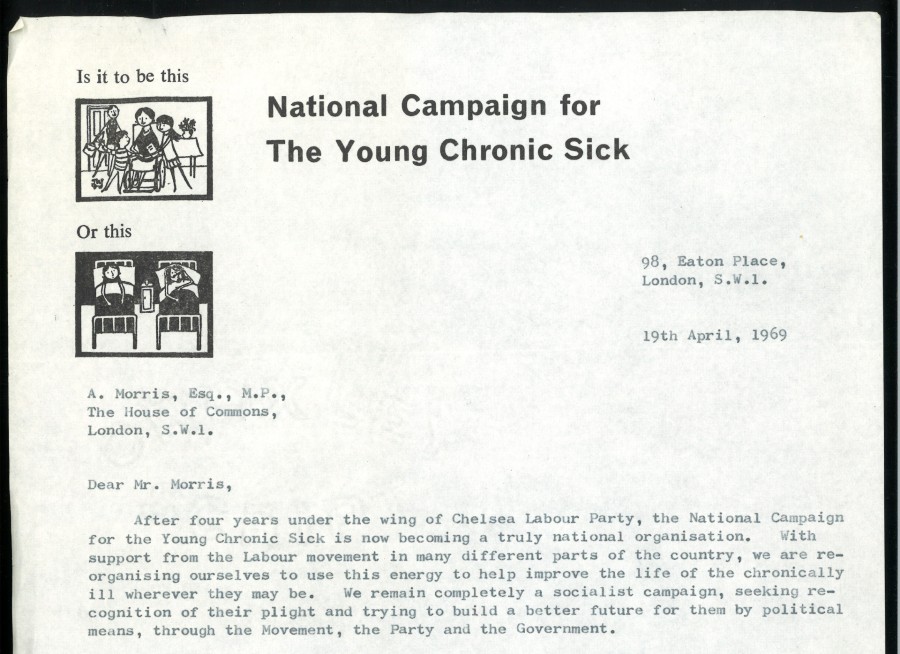
This is the front cover of the 3rd newsletter produced by the NCYCS.
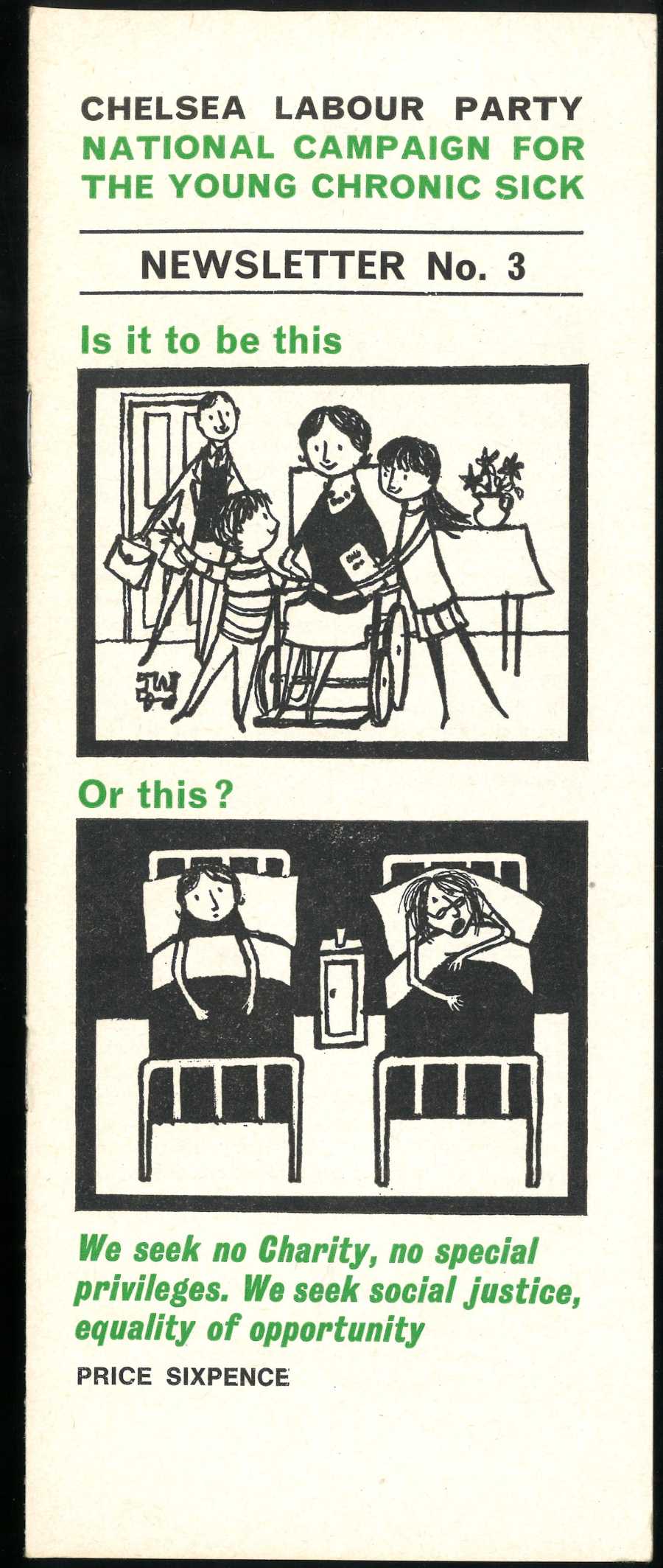
The NCYCS was founded to raise awareness and combat the practice of sending younger people with disabilities and chronic illnesses to live in geriatric wards. The campaign worked as Alf (and others) raised the issue during debates in Parliament and Section 17 of the CSDPA made provisions to prevent younger patients being given accommodation within such wards.
Listen to the section 'Causes and Campaigners':
An Income for All
One of the DIG’s key proposals was the introduction of a National Disability Income, provided as a form of social security and paid to all people with disabilities based on need.
DIG were keen to work with and lobby politicians to enact legislative change. They also incorporated help from academics and experts who understood the social security system. One key figure was Peter Townsend.
This extract is from an early working paper produced by DIG which used research done by Peter. It’s called Survey of the Welfare Problems of Correspondents of DIG:
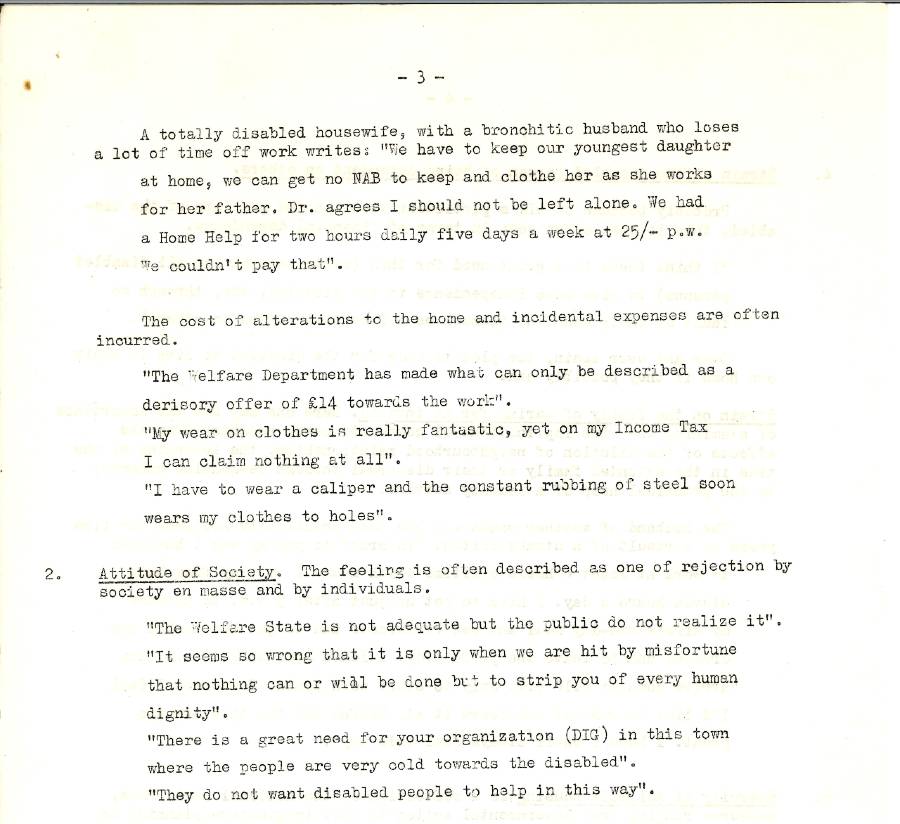
Townsend was an academic who had come to prominence in the 1960s for his work investigating the poverty which was still impacting communities across the UK despite the formation of the welfare state. Townsend co-founded the Child Poverty Action Group (whose papers are also held at LSE Library) and later went on to help found the Disability Alliance. He was also closely connected to DIG and here is an extract from a memorandum he sent to Morris in 1973 continuing to argue for an income for people with disabilities ‘by right’.
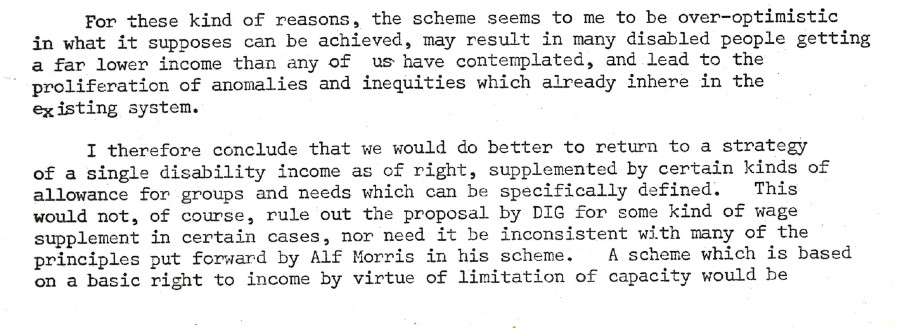
Listen to the section 'An Income for All':
Defend the 1970 Act!
The CSDPA was passed at the end of a decade which had been overseen largely by Harold Wilson’s Labour government. Indeed it was one of the last pieces of Labour legislation to get Royal Assent, squeezing its way into law on the 29 May 1970. Three weeks later there was a new Conservative administration in power.
Many of the Act’s provisions became the devolved responsibility of local authorities and there were considerable differences between how much authorities provided or were able to provide.
An article from 1971 in The Times called Disparities in the new deal for the disabled reported:
there appear to be great disparities in local responses to the obligations imposed by the Act.
Here’s an extract from a draft of a speech about Manchester’s Social Services Department, with a more positive appraisal of its effectiveness in implementing the reforms:
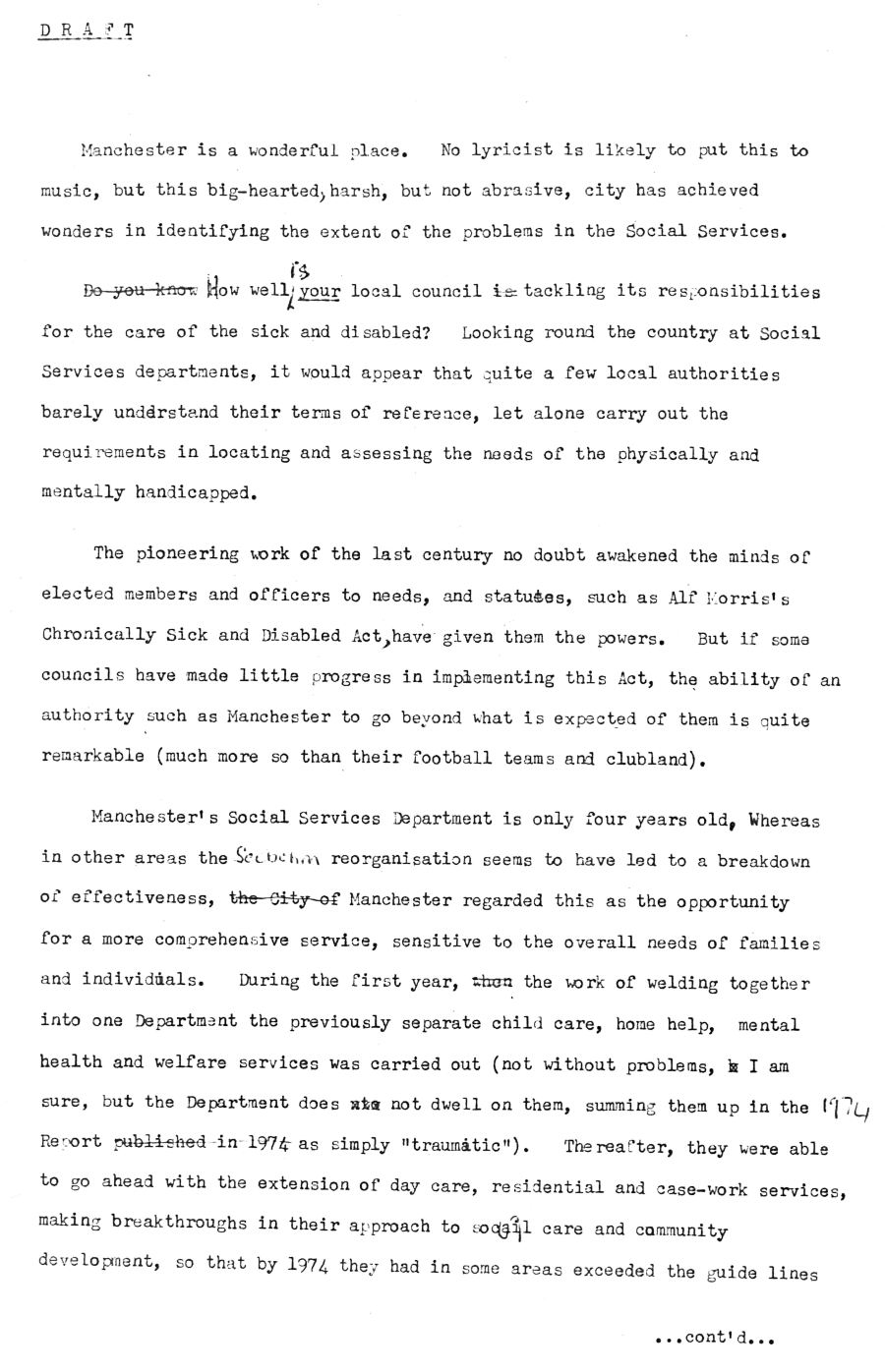
The twin elections in February and October 1974 saw the Labour Party narrowly returning to power with a slim parliamentary majority.
The mid to late 1970s saw a series of economic crises which plagued the government until the end of the decade and into the next. Alongside the economic uncertainty there were growing threats to public services and expenditure as the decade wore on and the government changed. This included many services and programmes designed for people with disabilities.
Here’s part of a 1975 letter sent from Action Research for the Crippled Child to Alf about the potential for increasing cuts to expenditure:
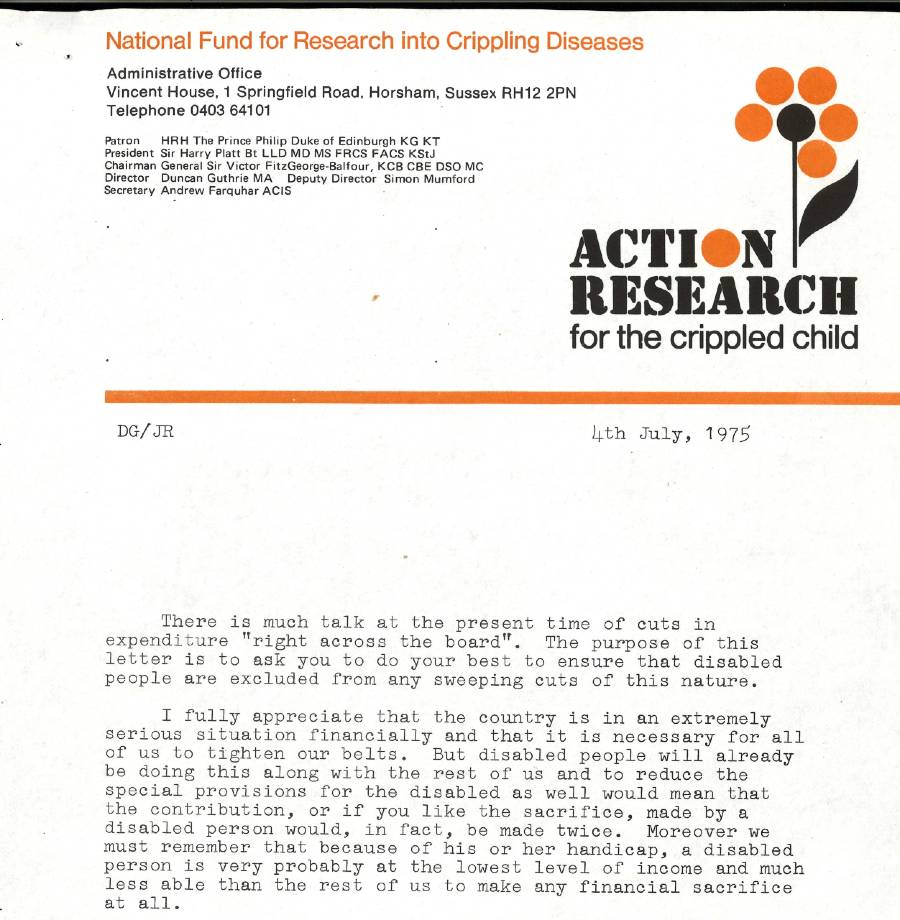
This is an extract from a newspaper headline about anti-cuts demonstrations by people with disabilities:
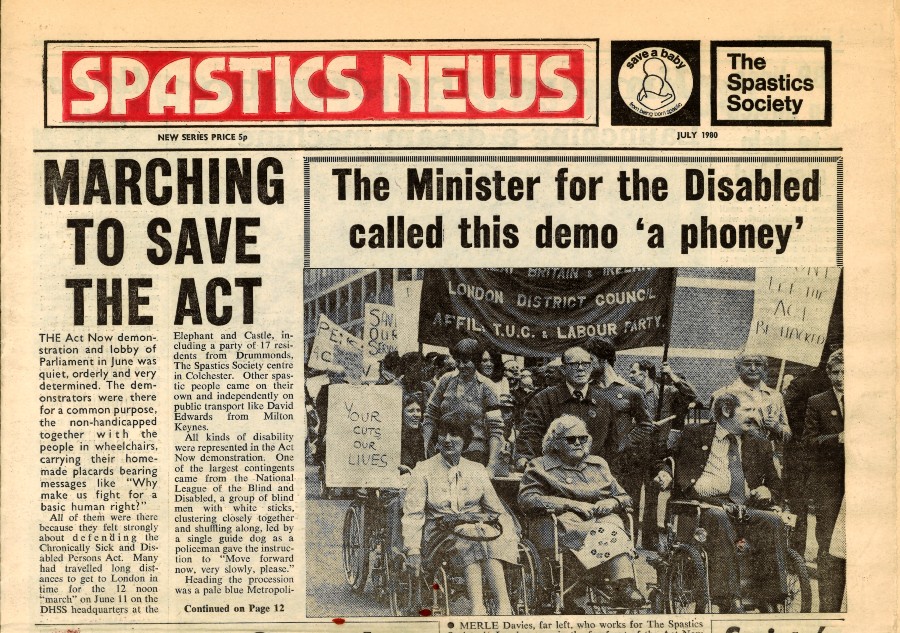
This flyer is from a conference organised by OUTSET: Action on Disability in 1980 and warns about the threats to the CSDPA.
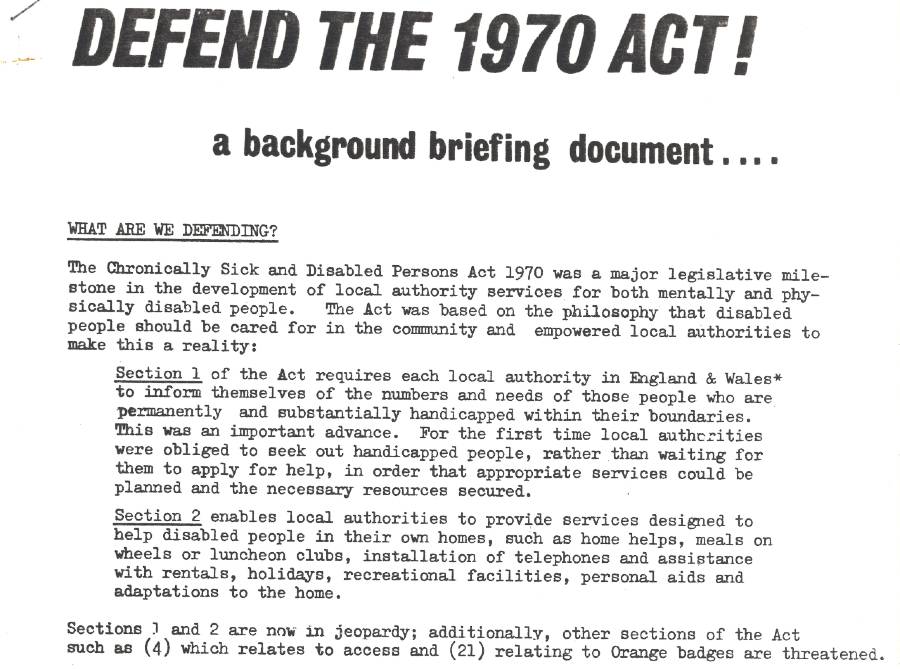
Listen to the section 'Defend the 1970 Act!':
Minister for the Disabled
Alf held his Parliamentary seat from 1964 to 1997 and even when Labour was out of power his Wythenshawe majority remained solid. In 1974 he was returned, again, to serve as MP but in a matter of months, and as a result of his years of work on behalf of people with disabilities, he was promoted to become the world’s first Minister for the Disabled.
Here’s an extract from an article in Community Care magazine about Alf’s new role:
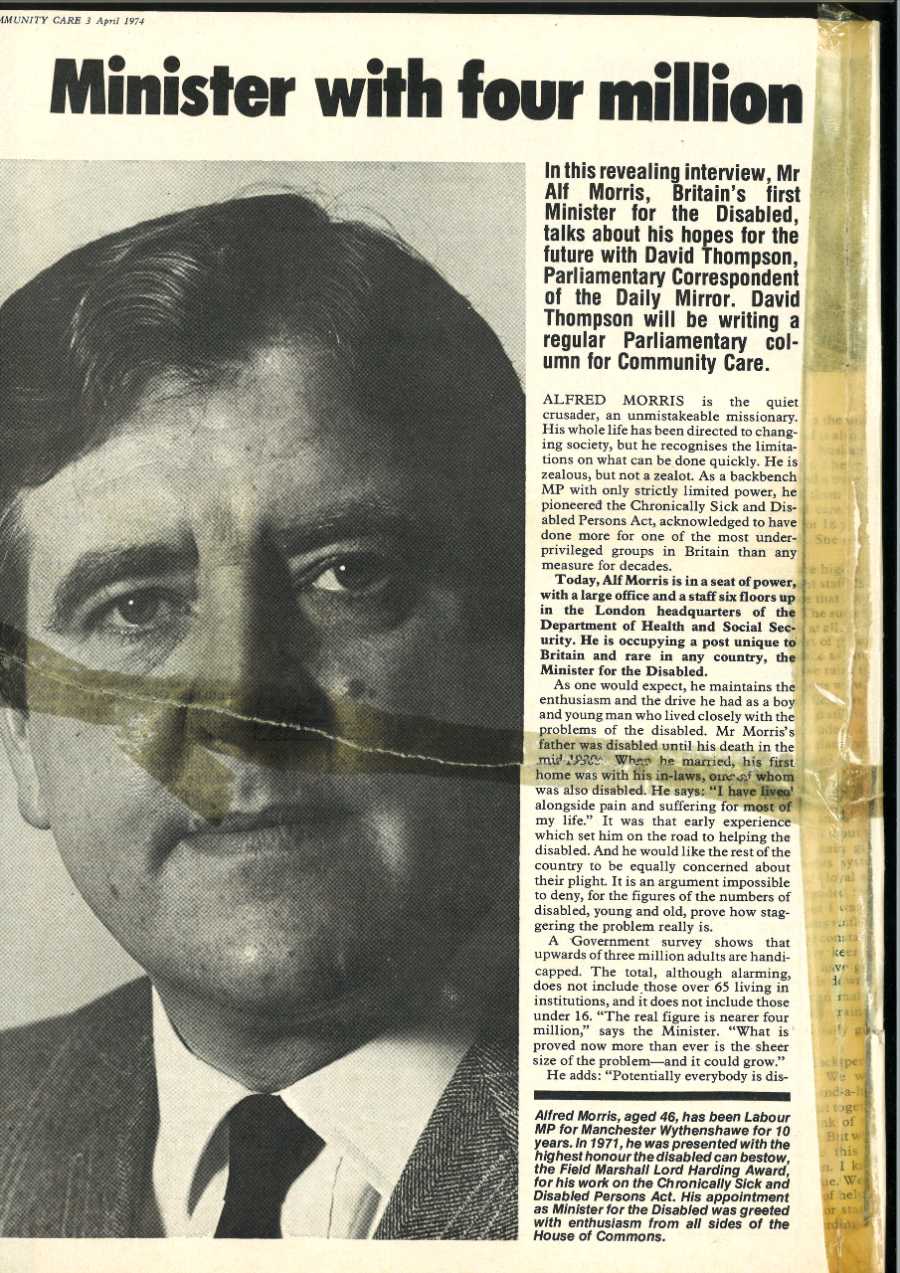
Despite the economic difficulties which beset the decade, campaigns and organisations continued to press the Government to provide support schemes and social security.
This is an extract from a newsletter from the Central Council of the Disabled, congratulating Alf on his promotion whilst also reminding him of the importance of building upon the work already done:
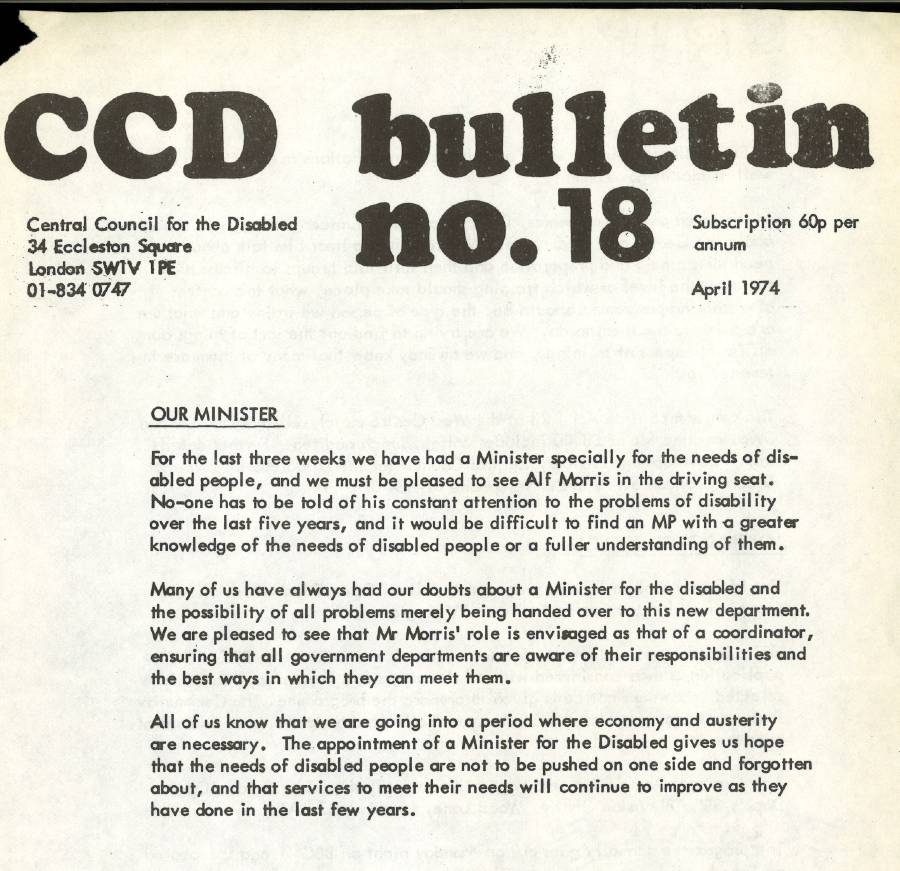
And here is a letter from the Disablement Income Group pressing Alf to continue to work for a National Disability Income:
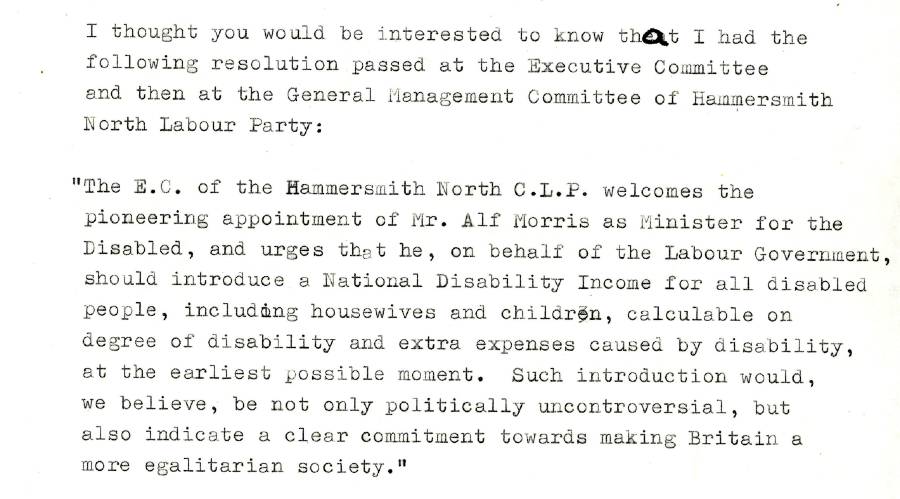
The early to mid 1970s saw a number of new benefits being introduced. The following two newspaper extracts highlighted two of these benefits, namely the 1975 Mobility Allowance and the Non Contributory Invalidity Pension.
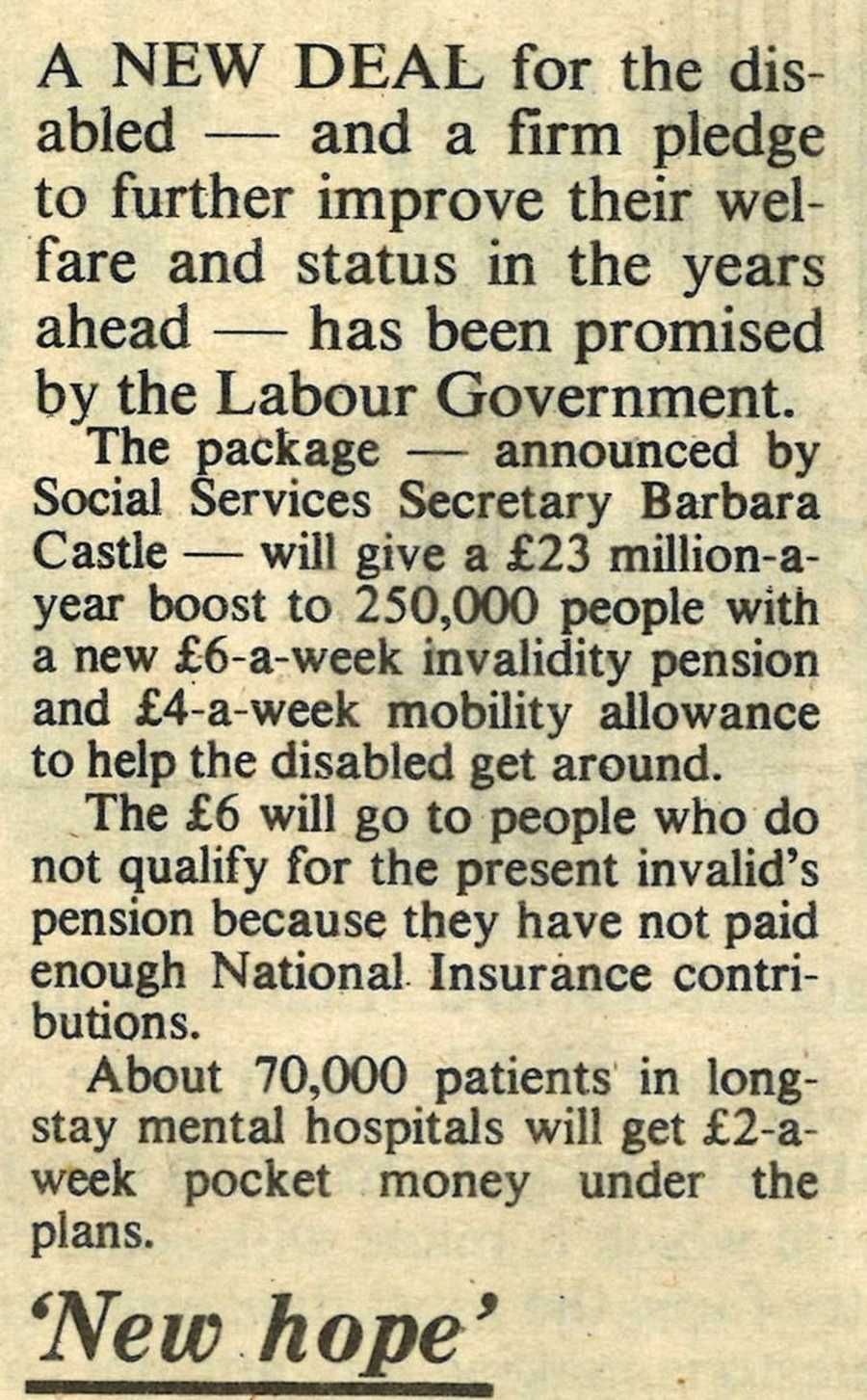
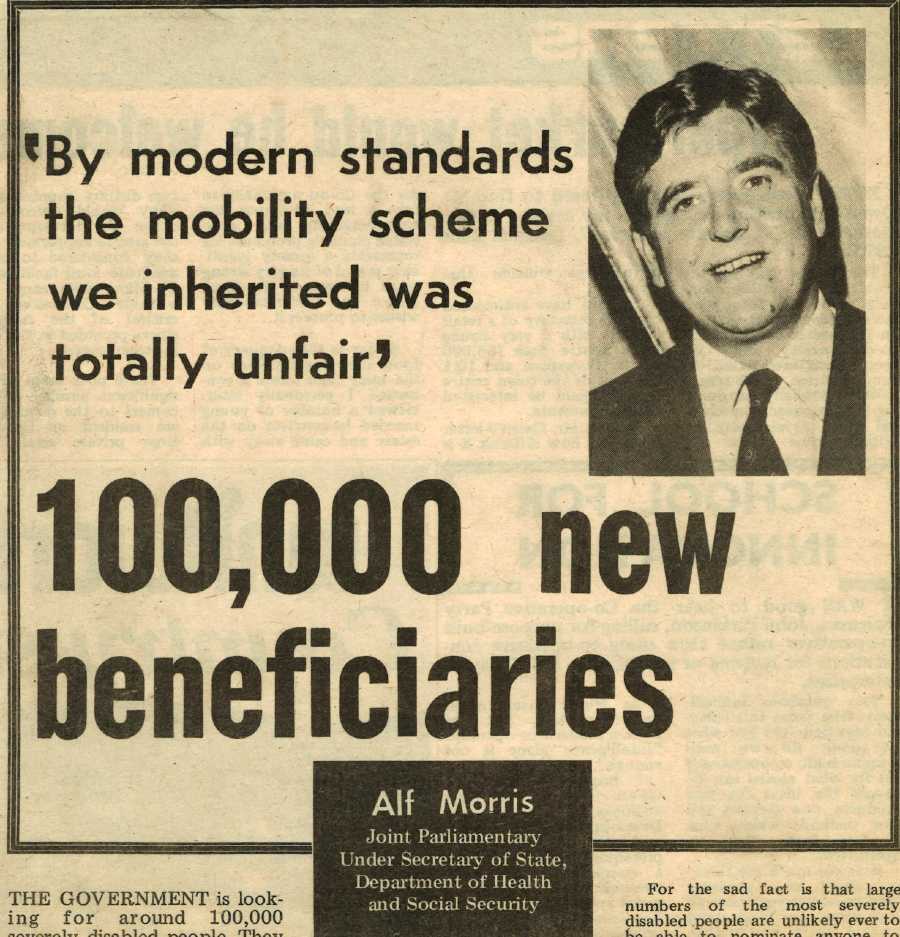 There was a degree of controversy over both however.
There was a degree of controversy over both however.
Listen to the section 'Minister for the Disabled':
Feminist Fightback
The non-contributory pension was one of the measures in the 1975 Social Security Act. It had been seen as a way of providing benefits to people with disabilities who had not worked, or were unable to work, and therefore could not contribute towards national insurance schemes.
Originally the payments were intended to cover men and single women but this was overturned while the Bill was still being debated and married women with disabilities were also included.
However, the Act stipulated that married women had to pass an additional ‘housewife’ test before they would receive any payment. This led to claims by feminists that married women with disabilities were treated like second class citizens.
Here are a couple of pieces of protest literature about the scheme:
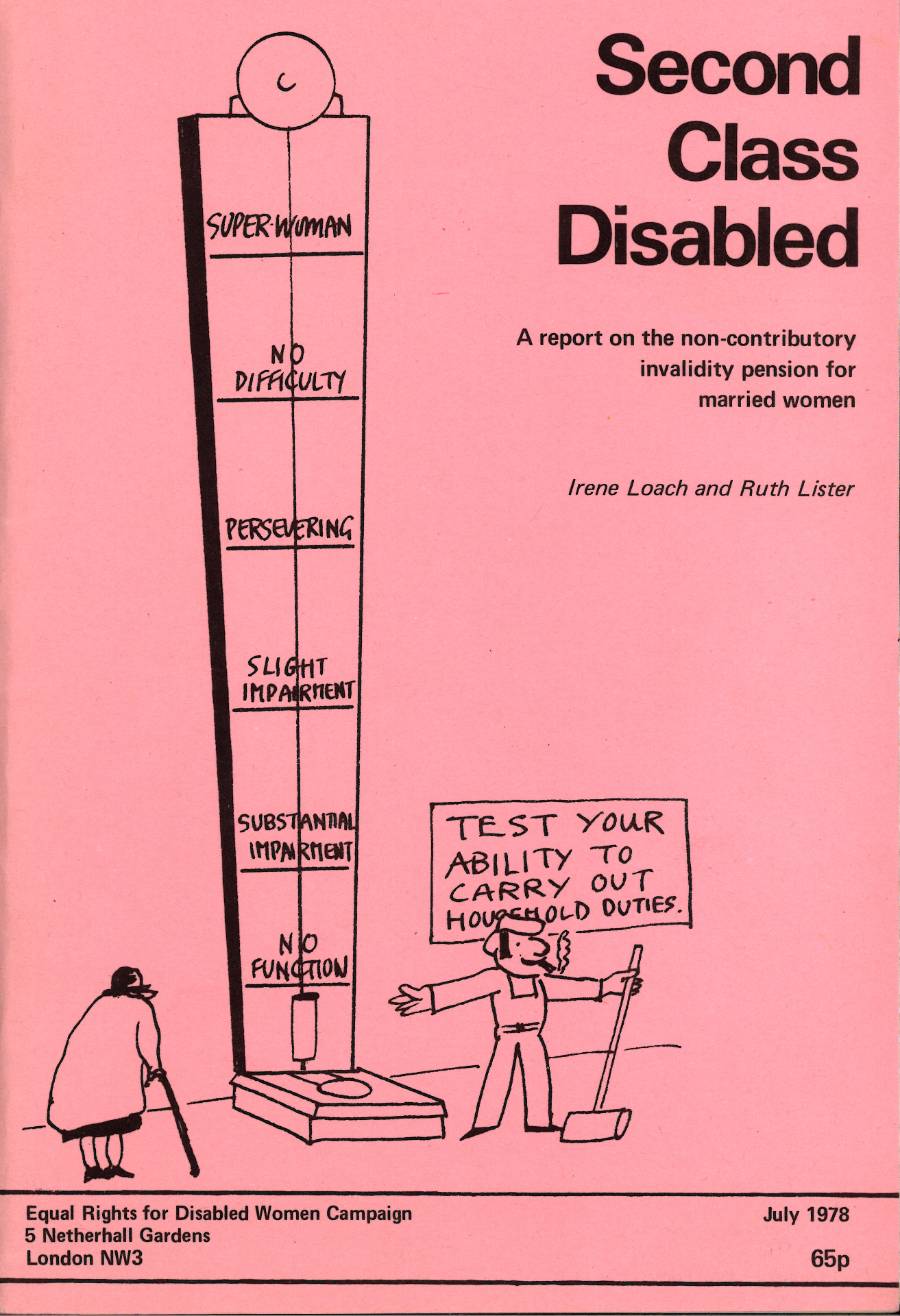
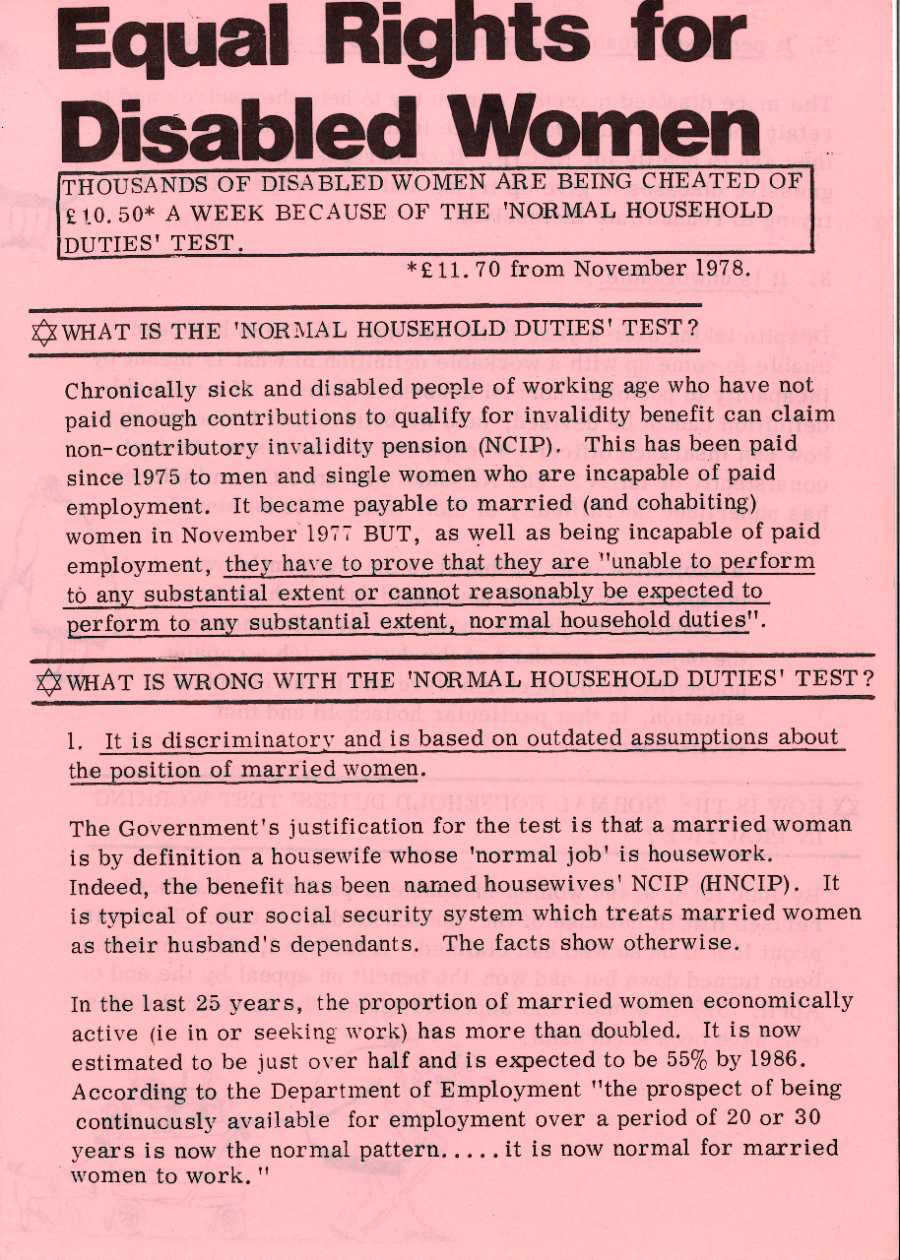
Eventually the 1984 Severe Disablement Allowance replaced the pension and provided benefits to men and women equally.
Listen to the section 'Feminist Fightback:'
Getting Around
The Mobility Allowance was put in place to provide all people with disabilities with a cash payment to help them to pay for transportation in order to get around.
One of the results of the new scheme was that it replaced so-called ‘invalid trikes’ or Invacars (after the company that first produced them). These were specially designed vehicles which had been in production since the end of the Second World War. The cars were available, free of charge, via the NHS to people with certain disabilities to use as a form of transport.
Read a detailed and fascinating history of these three-wheeled cars.
By the mid 1970s, however, there were safety concerns about their use and the fact that people with different kinds of disability were essentially excluded from owning one meant that the Mobility Allowance was proposed as an alternative scheme.
Labour politician David Ennals, who was Secretary of State for Social Services, announced the ending of the scheme.
View a video of Ennals being protested for the decision on the BFI website.
And footage of the cars in action on the same site.
Here’s a letter he wrote to people affected (and annoyed) by the changes:

Listen to the section 'Getting Around':
A Social Responsibility
This exhibition shows some of the changes which were brought about by governments, politicians and campaigners that impacted the lives of people with disabilities. As an MP and later Minister in government, Alf had much contact with groups leading such change. A considerable portion of an MP’s work is also, however, representing their constituency and providing assistance to members of the public.
The final item in this exhibition is a letter which was sent to Alf just after the CSDPA had passed. For data protection reasons it has been partly redacted:

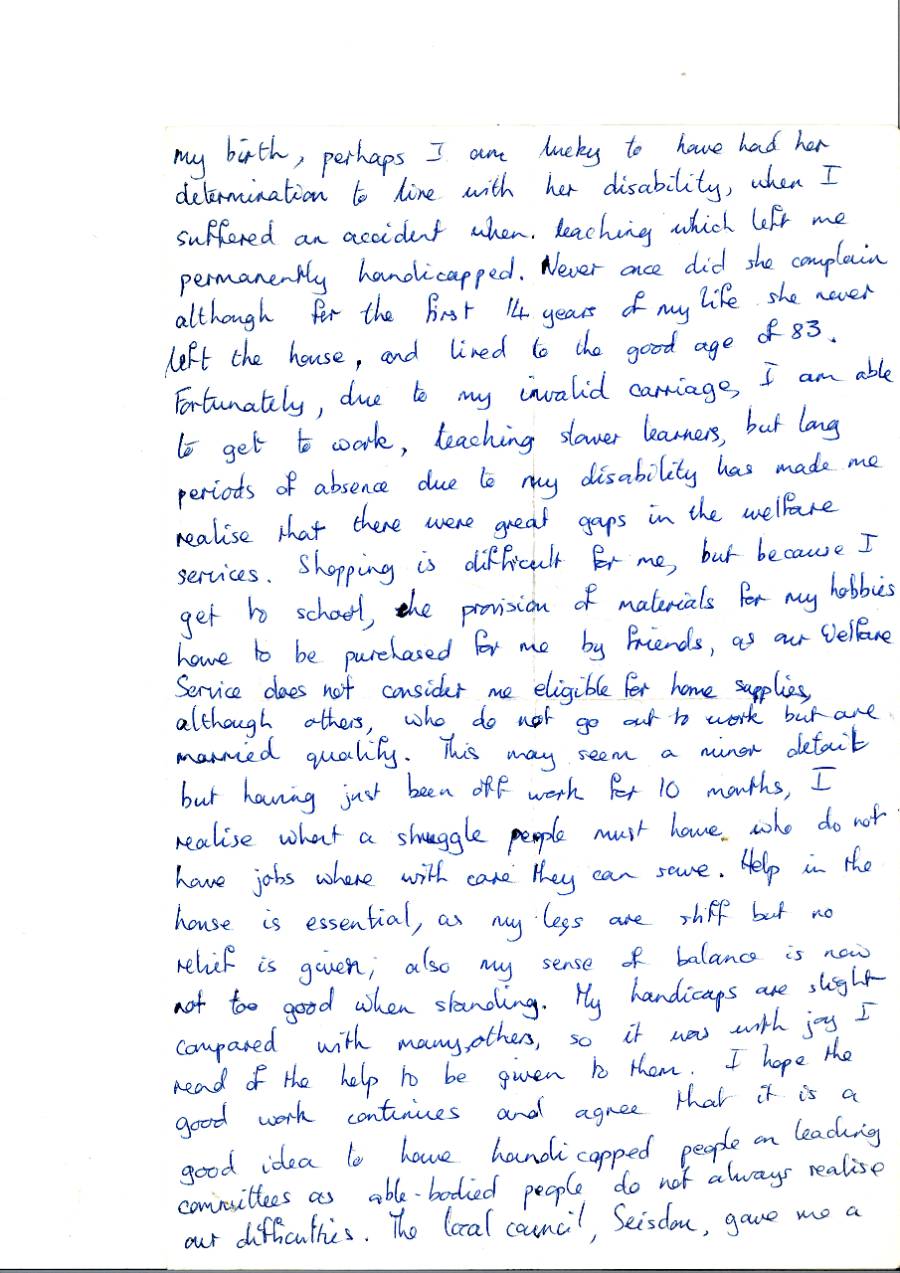
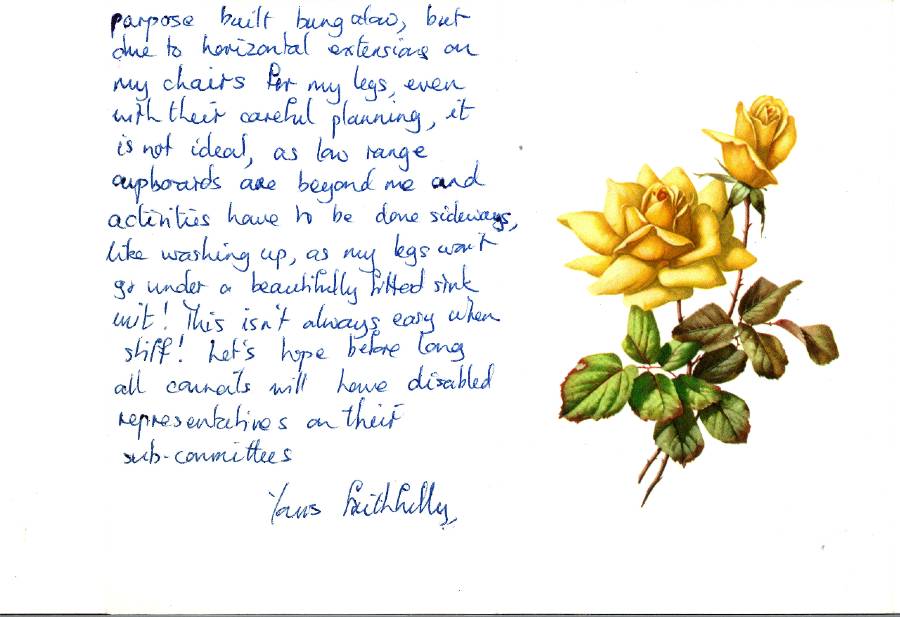
The letter is perhaps worth highlighting because it shows the positive difference that was made by the CSDPA and legislation like it, but it also highlights how a lack of proper representation by people with disabilities could lead to poor outcomes.
The social model of disability maintains that some of the most difficult barriers for people to overcome are caused by society. Disability should not therefore be understood as a medical issue which prevents individuals from joining society but rather how society prevents all people taking part within it. Changes advocated by Morris and other disability activists and allies continue to make the world more accessible for everyone.
Listen to the section 'A Social Responsibility':
Exhibition audio guide
We have created an audio guide for this exhibition where Indy takes us through the story and highlights some of the objects selected.
Listen to the audio guide:
1. From Raymond Rowley, Chairman of the League Against Cruel Sports, November 7th 1969
2. From Marcus Kimball MP, 6th November 1969
3. From Jack Ashley MP, 13th November 1969
4. Minutes of the Joint Ad Hoc Committee, 7th January 1970
5. Minutes of the Joint Ad Hoc Committee, 7th January 1970
6. Draft Provisions Disabled Peoples Pension ... Bill, 1969
7. The Education (Handicapped Children) Act, 1970
8. As Things Are, Disablement Income Group, c.1966
9. From Marsh Dickson, 13th April 1969
10. Newsletter No. 3, National Campaign for the Young Chronic Sick, Unknown date
11. DIG Papers No. 1: Survey of the Welfare Problems of Correspondents of DIG, E.J. Owtram, 1966
12. Memorandum from Peter Townsend, 1973
13. Draft of a speech, Unknown author, Unknown date
14. From Action Research for the Crippled Child, 4th July 1975
15. Spastics News, July 1980
16. Defend the 1970 Act! Leaflet, c. 1980
17. Minister with four million, David Thomson, Community Care, April 1974
18. Central Council of the Disabled Bulletin, 1974
19. From Brit Thornberry [DIG], 25th March 1974
20. A new deal for the disabled, Labour Weekly, 20 September 1974
21. 100,000 new beneficiaries, Co-operative News, 24 October 1975
22. Leaflet, Equal Rights for Disabled Women, c.1978
23. Second Class Disabled, Irene Loach and Ruth Lister, c.1978
24. From David Ennals, Unknown Date
25. Letter to Alf, August 1970
If you are the author, rights holder or are authorised to act on behalf of the author/rights holder and you are concerned that you have found material available on our website for which you have not given permission and which infringes your copyright, you have the right to request its removal.
Please contact us stating the following:
- Your contact details: this should include your full name, title if acting on behalf of an organisation, telephone number, email and postal address.
- The name and/or a description of the work/s.
- The exact and full URL where you found the material.
- Proof that you are the rights holder or are an authorised representative.
Upon receipt of a request to take down one or more pieces of work from its website, LSE Library will suspend as soon as is practicable publication of the material in question while an investigation is carried out. A staff Review Panel will investigate the query and will usually convey its decision within 4 weeks. If the case is complex, and additional time is needed, we will write to let the Requestor know.
Contact details
Email: library.enquiries@lse.ac.uk
Post: LSE Library, 10 Portugal Street, London WC2A 2HD
Please send any queries for the attention of the Copyright Officer.
Leave us a comment
We'd love to know what you think of this exhibition.
Please fill out this form and tell us.
Catch up on the exhibition events
Remembering the 1970 Chronically Sick and Disabled Persons Act
This event considered Alf Morris’ involvement in this Act and his work on behalf of people with disabilities, with perspectives on the legacy of the Act, and how debates and public awareness around disability have changed in the years since it was passed.
Watch the event recording
Educating Equally: what is needed?
On the International Day for People with Disabilities, this event looked at what is needed for children and adults with disabilities to have access to equal education, especially with the challenges of providing learning during and in the aftermath of COVID-19.
Watch the event recording
Manchester Digifest
The Manchester Histories DigiFest 2020 in September marked and celebrated the 50th anniversary of the Chronically Sick and Disabled Persons Act 1970, pioneered by the late Lord Alf Morris and 50 years of Disabled Peoples’ Rights.
Three short films about Alf’s life, created in collaboration with Brazen Productions, were also shown at the Digifest. You can watch the series of films on YouTube:
An interview with Tanni Grey-Thompson
Watch a short interview of Tanni Grey-Thompson conducted by Indy Bhullar as part of this exhibition.
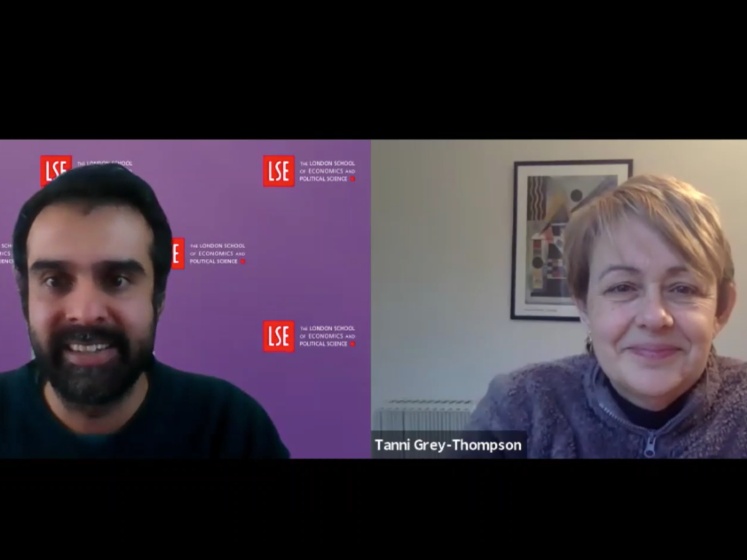 An interview with Tanni Grey-Thompson by Indy Bhullar exploring Alf Morris and his contribution to disability legislation
An interview with Tanni Grey-Thompson by Indy Bhullar exploring Alf Morris and his contribution to disability legislation
Explore our collections
Learn more about our collections by exploring our curated collection highlights.
Contact us
For further information, contact the team marking your email for the attention of Indy Bhullar.